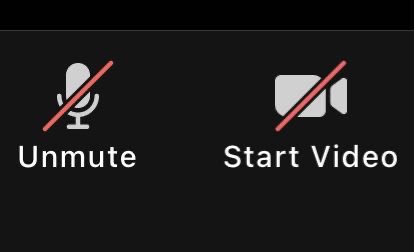Cut the Cameras: Students Opt to Shut Off Camera During Zoom Classes

Students have had to find new ways to get involved in class through the Zoom format.
November 13, 2020
Instead of attending in-person classes, some students are turning on their webcams to tune into Zoom classes while others opt to keep their cameras off.
As the CSU system moves forward with distance learning, students can expect to use Zoom as the principal mode of communication. There are various reasons why students would not want to appear on camera. Ultimately, the decision is left for them to decide what they want to show.
Some students choose to keep their cameras off in class. According to an article by Tabitha Moses, a doctorate candidate at Wayne State University School of Medicine that researches on behavior and the brain, there are five reasons students should be allowed to keep their cameras off: increased anxiety and stress, “Zoom fatigue,” personal obligations, right to privacy, financial means and lack of access.
Aylin Jimemez, a first year finance major at CSUN, chooses to keep her camera off in all of her Zoom classes.
“There are multiple reasons I keep my camera off. For example, I don’t always have the appropriate location. Things are going on in the background and sometimes I have to take care of my family members,” Jimenez said.
Jimenez believes that keeping the camera off can hinder her performance due to her falling asleep or becoming distracted. However, she tries to stay engaged by using the microphone to communicate with professors and classmates.
Since CSUN has not issued a requirement for students to keep cameras on, professors are relying on student engagement to gauge if they are understanding the material.
Erica Wohldmann, a CSUN psychology professor, would prefer to see her students’ faces but she feels that is unfair to make it a requirement for her classes. Wohldmann understands that situations are different for every student.
She explained that not everyone has the bandwidth to stream video and streaming on a phone can be difficult for those without a camera. She also said many students do not have a dedicated space to work or have other obligations. She feels like requiring cameras to be on is infringing upon a student’s privacy.
Currently, Wohldmann relies on students asking questions if they do not understand something in class.
“In my in-person classes, I can see all of their faces quite easily, and when they’re confused about a topic — I know immediately. Now I have to rely on them asking questions, which they do not always feel comfortable doing, regardless of the format,” Wohldmann said.
Online learning has also impeded the social element that comes with going to school and interacting with peers and professors.
Katherine Martinez, a third year pre-med biology major, prefers to keep her camera turned off, as she does have a daughter who is sometimes in the same room as her while classes are in session.
The most difficult part of online learning for Martinez is the loss of socialization that she otherwise would have had if classes continued in person. Her external obligations make it hard for her to engage with professors.
“Socializing with my professors has been the hardest part for me personally because I would usually stay after class to ask a quick question about any issues I had. At the moment that is not an option for me … since I am a single mother, I do work two jobs so it is hard for me to find the correct time to meet,” Martinez said.